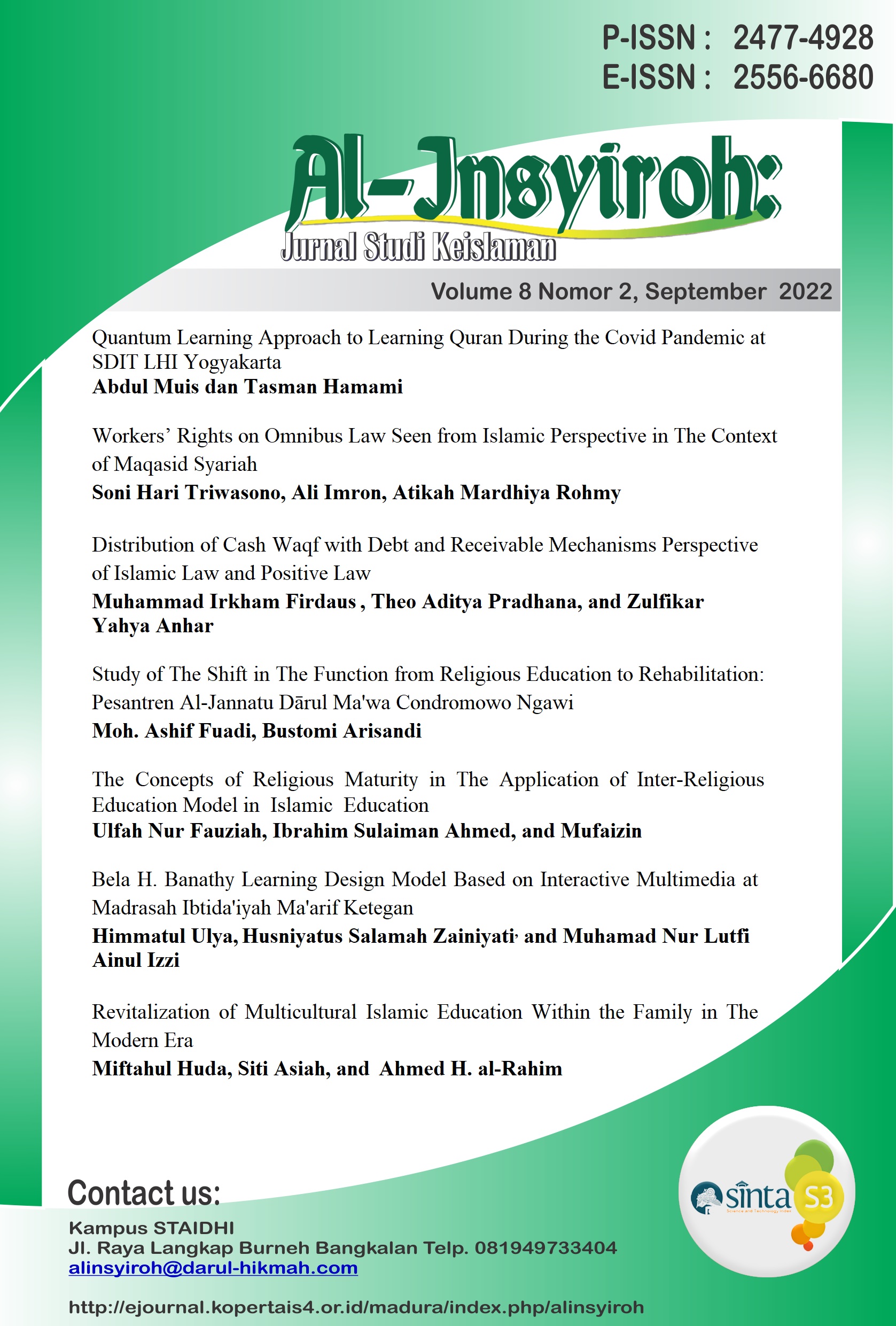Revitalization of Multicultural Islamic Education Within the Family in The Modern Era
Keywords:
Revitalization, Islamic education, Multicultural, Family, Modern EraAbstract
This essay seeks to evaluate multicultural Islamic religious education in the home, examine the issues of multicultural Islamic religious education in contemporary Indonesia, and Identify the modern family's rejuvenation of multicultural Islamic religious education This paper employs phenomenological qualitative methodology using a random sample procedure. Utilized data collecting methods include interviews, observation, and documenting. Multicultural Islamic religious education in the family can be applied in Islamic households that accept religious differences and diversity, equality, justice, togetherness, peace, and respect for cultural diversity both within and outside the family. Multicultural Islamic religious education in the family can be applied in Islamic households that accept religious differences and diversity, equality, justice, togetherness, and peace. The challenges facing multicultural Islamic religious education in the modern era are the level of multicultural Islamic religious education that has not yet reached its maximum level and the diminishing sense of national identity among the future generation, particularly among school-aged children. Ways to revitalize multicultural Islamic religious education in the family in the modern era are: inclusive attitude in life; parental control in providing awareness, enlightenment, empowerment, and role model for children to wisely use the internet or social medias to become a complete human being; parents emphasizing the moral aspect in educating their children; parents instilling values character in children that come from religion, Pancasila, culture, and Indonesia; and parents emphasizing the moral aspect in educatingReferences
Abdillah, Masykuri. “Aktualisasi Islam Dan Keindonesiaan Dalam Koteks Ideologi Negara Pancasila.†Himmah 4, no. 1 (2020): 260–274. http://journal.unas.ac.id/himmah/article/view/1100.
———. “MODERASI BERAGAMA UNTUK INDONESIA YANG DAMAI: Perspektif Islam.†Prosiding Seminar Nasional Institut Agama Hindu Negeri Tampung Penyang Palangka Raya 2, no. 2 (2019): 33–40. http://prosiding.iahntp.ac.id/index.php/seminar-nasional/article/view/13.
Anisah, Siti. “Implementation Qishash Law for Build The Justice.†Journal of Islamic Law Studies (JILS) 1, no. 2 (2018): 98–111. https://scholarhub.ui.ac.id/jils/vol1/iss2/1/.
Choi, Il young, Hyun ju Choi, Jeong hee Lim, Seung hye Jung, Jae kyeong Kim, and Joon ho Kim. “Predictors of Life Satisfaction among Multicultural African Families in South Korea.†Journal of Psychology in Africa 29, no. 1 (2019): 7–12.
Dewi Murni. “Toleransi Dan Kebebasan Beragama Dalam Perspektif Al-Quran.†Jurnal Syahadah 6, no. 2 (2018): 72–90. http://ejournal.fiaiunisi.ac.id/index.php/syahadah/article/view/232.
Faisal Ismail. Islam Idealitas Haniyah Dan Realitas Insaniyah. Yogyakarta: PT Tiara Wacana, 1999.
Garba, Ahmed Salisu. “The Prospects and Problems of the Marrakesh Declaration on the Rights of Religious Minorities in Muslim Majority Communities.†Review of Faith and International Affairs 16, no. 4 (2018): 47–59. https://doi.org/10.1080/15570274.2018.1535038.
Hamidy, Mu’ammal, AM, Imron, Fanany BA, Umar. Terjemahan Nailul Authar: Himpunan Hadits-Hadist Hukum. Edited by 2. Surabaya: PT Bina Ilmu, 1991.
Ibnu Ishak, Ibnu Hisyam. Sirah Nabawiyah: Sejarah Lengkap Kehidupan Rasulullah Saw. 19th ed. Jakarta: Akbar Media, 2017.
Irfan, Try Wiganda. “Konsep Kewarganegaraan Klasik Dan Modern Dalam Perspektif Islam.†Journal of Moral and Civic Education 2, no. 1 (2018): 38–43. http://jmce.ppj.unp.ac.id/index.php/JMCE/article/view/89.
Miftahul Huda. “SOCIOLOGICAL ASPECTS OF MULTICULTURAL ISLAMIC RELIGIOUS EDUCATION.†Al-Insyiroh: Jurnal Studi Keislaman 7, no. 2 (2021): 122–143. http://ejournal.kopertais4.or.id/madura/index.php/alinsyiroh/article/view/4990.
Moenawar Chalil. Kelengkapan Tarikh Nabi Muhammad Saw. Jakarta: Gema Insani Press, 2001.
Muhammad Tholhah hasan. Islam Dalam Perspektif Sosio Kultural. Jakarta: Lantabora Press, 2005.
Ozbilgehan, Mehmet, and Suleyman Celenk. “A Review of Multicultural Education in Northern Cyprus and Turkish Learning Levels of Students from Different Cultural Backgrounds.†Revista de Cercetare si Interventie Sociala 73 (2021): 114–132.
Ramdhan, T. W. (2019). Model Pengembangan Kurikulum Multikultural. Al-Insyiroh: Jurnal Studi Keislaman, 5(2), 39-53.
Rosyad, A M. “The Integration of Islamic Education and Multicultural Education in Indonesia.†al-Afkar, Journal For Islamic Studies 3, no. 1 (2020): 164–181. https://al-afkar.com/index.php/Afkar_Journal/article/view/87.
Rosyad, Ali Miftakhu. “Implementasi Nilai-Nilai Multikulturalisme Melalui Pembelajaran Pendidikan Agama Islam.†Risalah: Jurnal Pendidikan dan Studi Islam 5, no. 1 (2019): 1–18.
tafsiribnukatsironline. “Tafsir Surat Al-Anfal Ayat 61-63.†Last modified 2015. http://www.ibnukatsironline.com/2015/05/tafsir-surat-al-anfal-ayat-61-63.html.
Ulya, Inayatul. “Pendidikan Islam Multikultural Sebagai Resolusi Konflik Agama Di Indonesia.†Fikrah 4, no. 1 (2016): 20. https://media.neliti.com/media/publications/61831-ID-pendidikan-islam-multikultural-sebagai-r.pdf.
Utami, Kartika Nur. “Kebebasan Beragama Dalam Perspektif Al-Qur’an.†Kalimah 16, no. 1 (2018): 23. https://ejournal.unida.gontor.ac.id/index.php/kalimah/article/view/2511/1558
Downloads
Published
How to Cite
Issue
Section
License
Copyright (c) 2022 Al-Insyiroh: Jurnal Studi Keislaman

This work is licensed under a Creative Commons Attribution-ShareAlike 4.0 International License.

This work is licensed under a Creative Commons Attribution-ShareAlike 4.0 International License.









